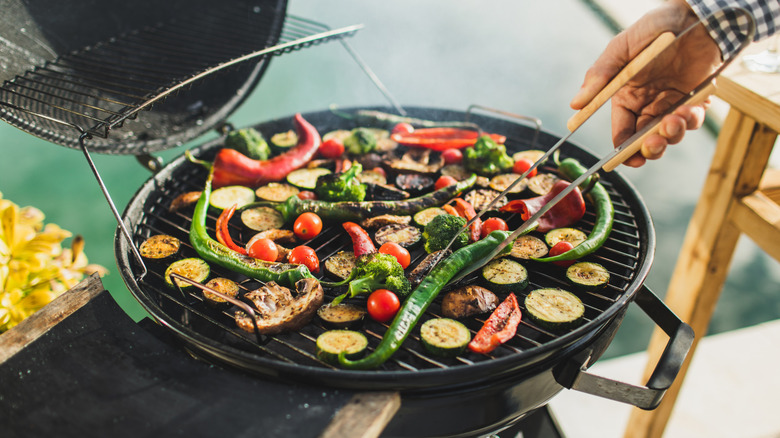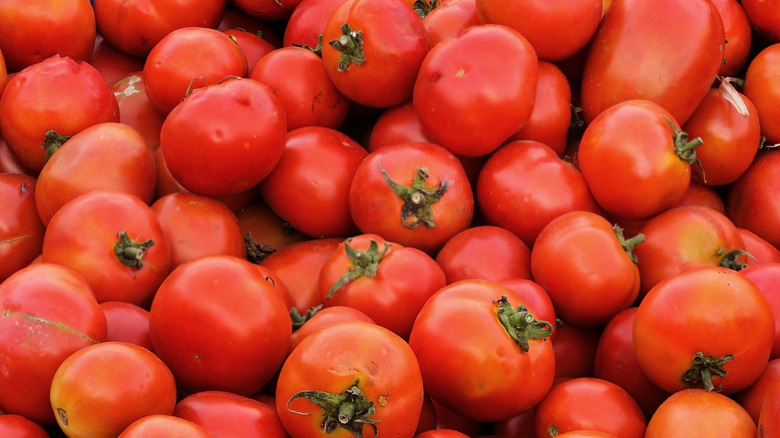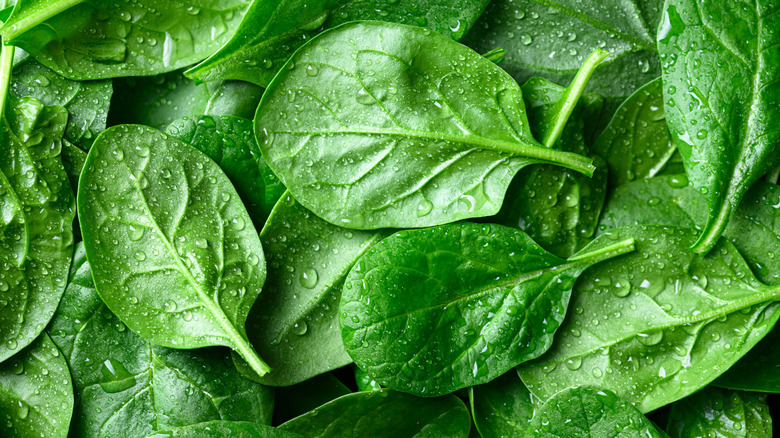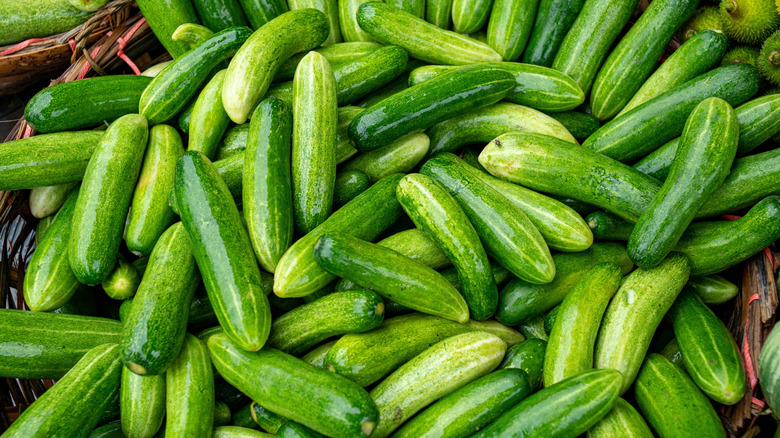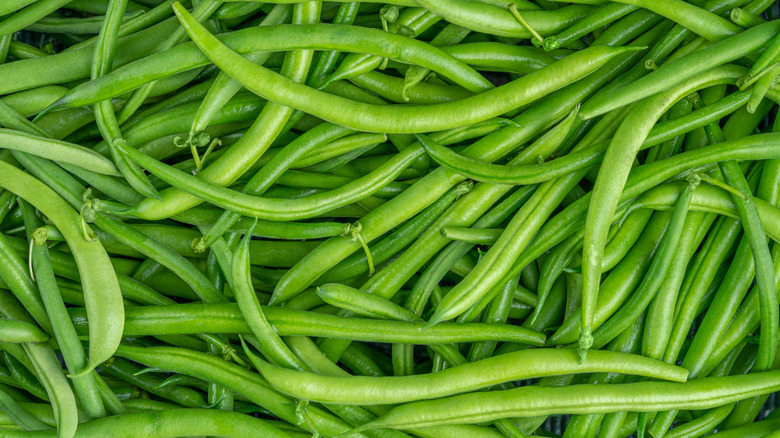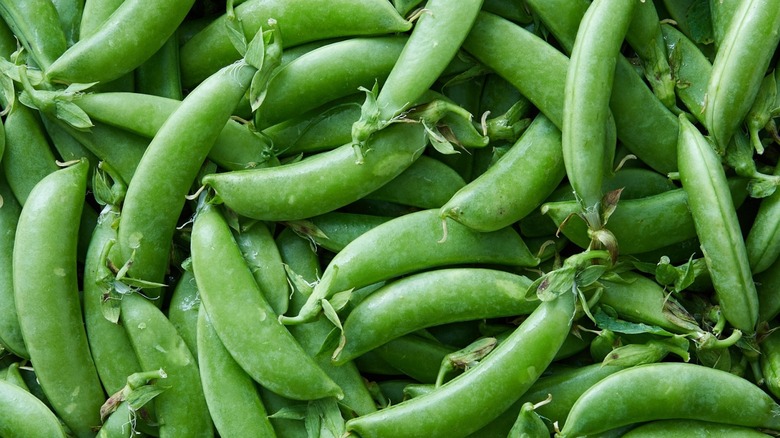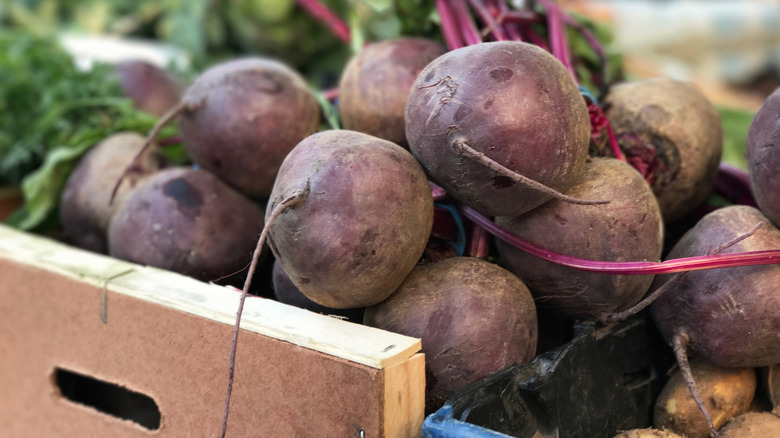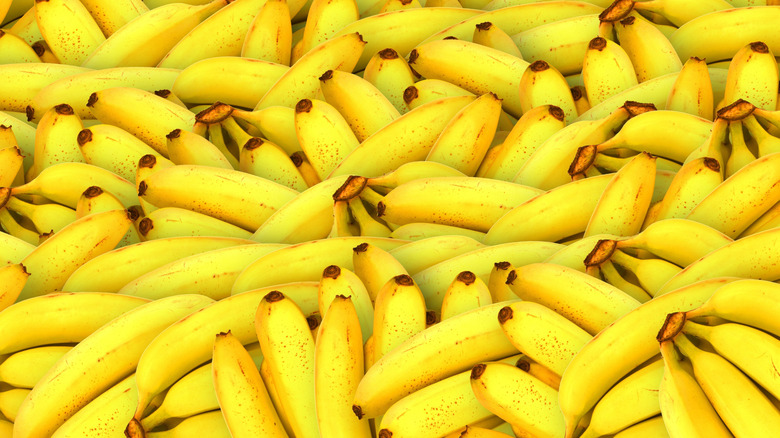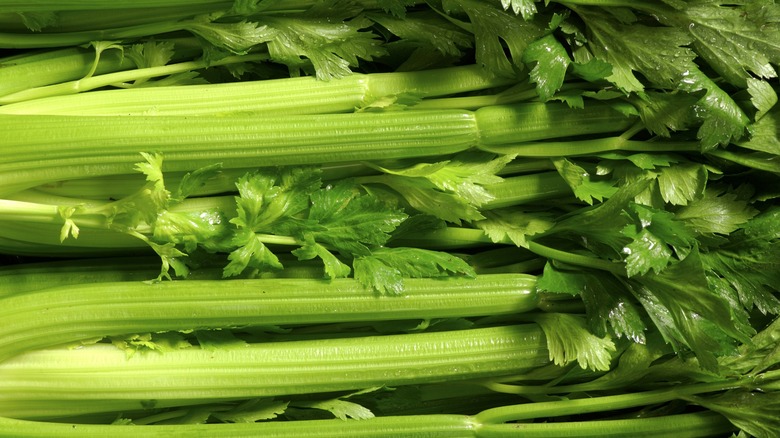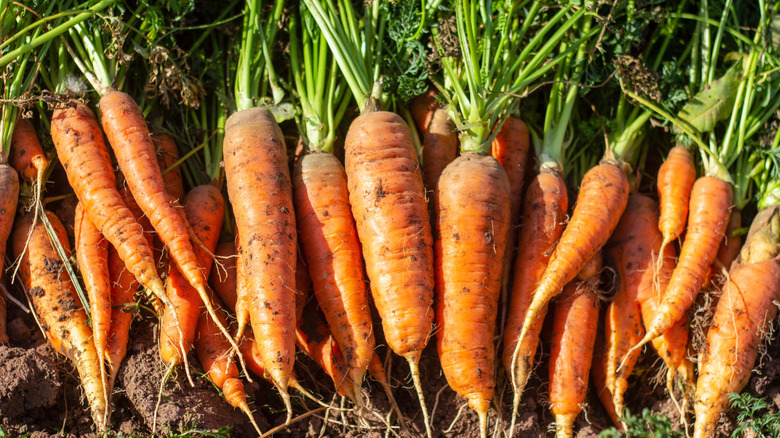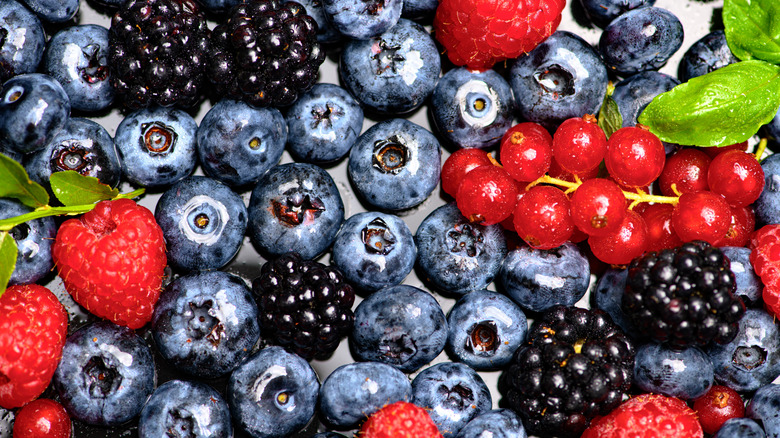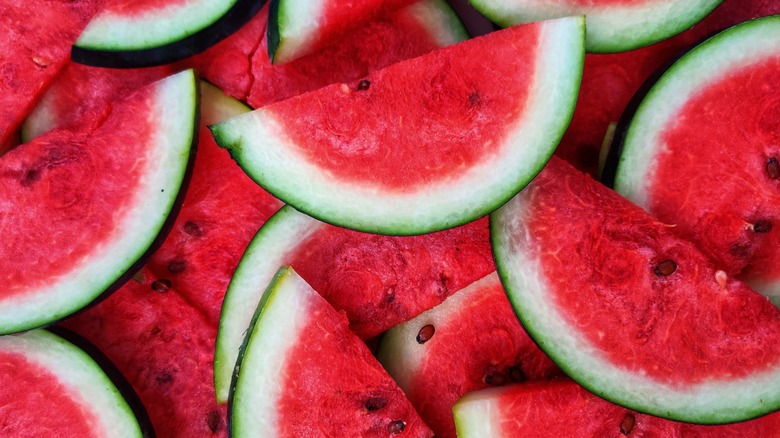Fruits And Vegetables You Should Never Put On The Grill
Novice grillers may get amped up by the prospect of cooking everything they can over an open flame on a backyard grill. But the more seasoned grill master knows that certain foods are better suited for open-flame cooking, especially when it comes to fruits and vegetables. Watching the masters make magic on grilling shows and share tips and tricks for grilling fruit and veg might make it seem like you're ready to experiment, but the danger of making a mess of both your grill and your grill-out is very real.
Some veggies like peppers and zucchini make themselves at home on a grill with no trouble at all. But others are bound to give you a hard time. It's easy to avoid sticky situations once you know which fruits and vegetables should never hit your grill directly. With a bit of helpful guidance, you can easily arrange your menu to omit produce that doesn't do well under open fire cooking conditions, whether due to their composition and texture or their shape and size. These dozen fruits and vegetables are undeniably delicious as part of your barbecue menu, but they're among the worst foods to put on your grill. Understanding why can save you time, trouble, cleanup work, and even money wasted on food that could end up in the trash instead of on the table.
Tomatoes
Roasted tomatoes are a definite delicacy on your dinner table, but making them directly on your grill is never a good idea. The excess liquid can make a mess of the grate and ruin the tomatoes in record time, ruining your barbecue spread by preventing you from finishing grilling tasks. Tender skin and flesh on certain types of tomatoes make them extremely touchy when exposed to open flames; greater levels of ripeness make it even more challenging.
Depending on how long you let the tomatoes sit on the surface, you may need to clean your grill before proceeding to prevent excess char from imparting a burnt flavor to anything else that cooks in the spot where the tomatoes went awry. It sounds like an awful lot of trouble just to add a little gourmet flair to a vegetable that works much better in its fresh and original state. If roasted tomatoes are a must for your muster, stick with oven roasting to keep everything as clean and edible as possible.
Leafy Greens
One of the most obvious items to cross off your grilling agenda is leafy greens. Though infusing them with enticing smoky flavors might seem like a good idea, laying delicate leaves like spinach and iceberg over an open flame is a recipe for a quick and sloppy disaster. As one of the worst foods to grill, these tender leaves may instantly catch fire or smolder instead of cooking evenly. Either way, you'll be fielding clouds of smoke and end up with a stack of unusable greens to disappoint your hungry audience. It's best to either cook your greens in a more traditional method or keep them cold for a crisper and fresher experience.
If grilling greens is such a poor use of your backyard cooker, you may be wondering why you've heard of Caesar salads made with grilled romaine. The clustered shape of the romaine head keeps the leaves tightly anchored, preventing them from slipping through the grates. The dense shape also provides a singular surface to receive the heat, a feature loose-leaf greens don't have. But if you're not a seasoned chef, avoid one of the worst mistakes you can make while grilling vegetables and leave the greens in the salad bowl where they're safe, cool, and ready to be enjoyed.
Cucumbers
If it's never occurred to you to lay cucumbers on your grill to give them a little smoky flavor, keep thinking like that. These juicy fruits are so water-heavy that placing them directly on a heated grate will turn them into mush in no time. Even with traditional oven cookery, there are relatively few recipes that include cucumbers as part of a cooked dish; they're almost always consumed raw and added to a heated dish after cooking is finished, if at all. And if those rules apply to kitchen cooking, it's best to carry them through in your grill cooking as well.
Having relatively little sugar as part of their composition, cucumbers also don't offer much in the way of caramelization, a key feature that makes grilling fruits and vegetables worth the effort. Slice them up for a salad or make sticks for the hummus and ranch dips, but keep them far from the heat of the grill to ensure a successful outdoor banquet.
Green beans
Once you have the fever for heating everything on a grill, you might move toward green beans. After all, their relatively tough skins sure seem ready-made to take on the fire without sustaining damage. But all it takes to add more smoke than you need to your open fire operation is one or two green beans slipping through the cracks and catching fire. Even worse, they could get stuck halfway through the grates, leaving you to pull out half-charred, half-raw green beans that didn't deserve to meet that sort of end.
Rather than risking the heartbreaking loss of your green beans to the unyielding heat that awaits them below, try creating a makeshift pan out of a length of aluminum foil and resting the green beans within, then laying the pan on the grate. You can apply heat without risking the fall through or the burn, and you'll be free to drizzle oils or marinades to add flavor without splattering your other items unintentionally.
Snap peas
There's no sense in risking a failed attempt at cooking snap peas on your grill once you realize that these relatively two-dimensional pods can easily fall through the grates. You could end up with a smoke problem as the peas take on the full brunt of the fire below, as well as losing an important side dish. And that isn't to mention the waste of food and money due to a lack of foreknowledge about how touchy snap peas can be around the backyard barbecue. Watching the pros lay endless pea pods on the grill just to get a little char seems like way too much work for what should be a fun culinary excursion.
The sturdy outer skin of snap peas may trick you into believing they are a natural fit for the cookout, but don't let the tough exterior fool you; these legumes can turn your dream cookout into a fiery nightmare. In a dish on the picnic table, where your guests can enjoy them as crudites? Absolutely! On the grill, where they may add too much fuel to your fire? Not worth the risk.
Beets
If you're ambitious enough to toss a few beets on the grill to add healthy plant-based goodness to your menu, you might want to think twice. Not only is it a challenge to apply enough heat to cook them thoroughly, but it's also a real task to time and tend their placement on the grill when your other items are prone to heating up relatively quickly.
To include beets in your grilling extravaganza, you're better off wrapping these roots in handy-dandy aluminum foil rather than laying them directly on the grill. Even preparing them in slices can spell disaster on your heavy-duty grate, thanks to the high sugar content, which can caramelize and turn into a charcoal crust before you have a chance to tend to the situation. It's much wiser to keep your beets under control with an aluminum foil sheath than to set yourself up for a major cleanup job after the cookout ends. Wrap them up for open-fire cooking or create a makeshift pan out of foil instead of putting them directly onto your grill, and see if you can help your beets beat the heat.
Bananas
Roasted bananas are an undeniable delicacy that maximizes the sugary flavor in the fruit by caramelizing the exterior and softening the creamy interior. However, opting for an alfresco heat bath on your barbecue grill is a sure way to turn your intended dish into a pile of mush. Removing them from the peel makes the relatively delicate texture of bananas extremely susceptible to deterioration when exposed to an open flame. If cooked with the peel left on, bananas may develop a charred skin that diminishes the sweet flavor of the fruit inside. None of this sounds like a sweet way to bring a tropical touch to your picnic table smorgasbord.
Rather than relying on the grill as your cooking surface, wrap peeled bananas in aluminum foil and lay them on the grates to cook them without getting banana guts all over your cooker. Expect a quick cook time for a fantastic barbecued dessert to serve with a few chocolate chips sprinkled on top and a drizzle of peanut butter. You can even serve them in the foil to avoid using extra plates.
Celery
Watery vegetables tend to do the worst when cooked on a grill, and celery is no exception. The lack of chemical complexity doesn't give the heat much to work with to elevate the flavor. Once the water cooks off, you could be left with a stringy mound of sadness that nobody wants to pile onto their plate.
How much sense does leaving celery off the grill make? Think of how many times you've seen celery incorporated into water-heavy dishes like soups and stews, or worked into Asian dishes where broth is a base component. In every instance, the cooking methods make sure celery has enough water around it to keep its structure intact. So, giving it the ultra-high heat of real flames is a sure-fire way of removing what makes it such a unique vegetable. Chop it up for the veggie platter and keep it in the cool where it belongs.
Carrots
Carrots are usually relegated to the relish tray or the charcuterie board at even the simplest barbecues, thanks to their cool, crisp, and refreshing personality that does much better as a cold dish than a hot one, where cookouts are concerned. The temptation to add them to the grill to give them a little smoky magic may overwhelm even the most seasoned grilling guru, especially given the grill-friendly size and shape of whole carrots.
Try it out and you're likely to discover just how quickly carrots can shrivel when cooked over open heat rather than steamed or boiled to incorporate liquid back into the flesh. They may turn soft and sweet in a soup or stew, but as a grilled vegetable, they're more apt to become shriveled and dry. Instead of grilling your carrots, try roasting them on a sheet pan in a traditional oven at 400 degrees Fahrenheit for 10 to 15 minutes to soften the flesh and infuse them with a sweet, caramelized flavor. Both your grill and your guests will thank you for your culinary cleverness.
Berries
Roasted strawberries can lend a sophisticated element to your backyard get-togethers, but the risk is high that your succulent fruit will become a sloppy goo once fire becomes part of the equation. If strawberries with their larger size are subject to such wanton destruction when placed under direct heat, you can imagine what raspberries, blackberries, and blueberries will go through in a similar scenario. It won't take much before you have a massive seething berry gunk coming up your grilling groove.
If you simply can't go through a cookout without the elevated elegance of roasted berries, you're much better off using the indoor oven method to control the heat and the surface area and prevent an easily avoidable mess. And if the grill is your only option for applying heat, consider wrapping your berries in foil or using a pan to keep juices and flesh contained. It's much easier to scrub those implements in the sink if they become unreasonably messy than it is to give your grill a full-on scrub down in the middle of your culinary conjuring.
Watermelon
You may have seen the trend of outdoor chefs slapping slices of watermelon on the grill and serving up charred wedges with enticing grill marks crisscrossing the surface. But this is an advanced-level move that could go wildly wrong in the hands of an inexperienced outdoor cook. The potential for making a mess you can't easily recover from in the middle of your beach day buffet makes watermelon a total no-go for your grilling plans, especially if you're a relative newcomer to the world of open flame cookery.
How touchy is watermelon that you should reserve this fruit for your advanced grilling adventures somewhere down the line? The sugary juices and fibrous flesh can quickly turn to sludge when heat is applied in the direct manner that grilling provides. Turn away even briefly to tend to your other items, and you could find a mushy mess that renders your grill unusable without a proper cleaning. With cold watermelon being such a sweet and refreshing treat all on its own, why would you ever roll the dice by trying to give it fancy grill marks just to add a little extra sweetness? Save that wizardry for hot dogs and burger recipes that will make you the king of the cookout.
